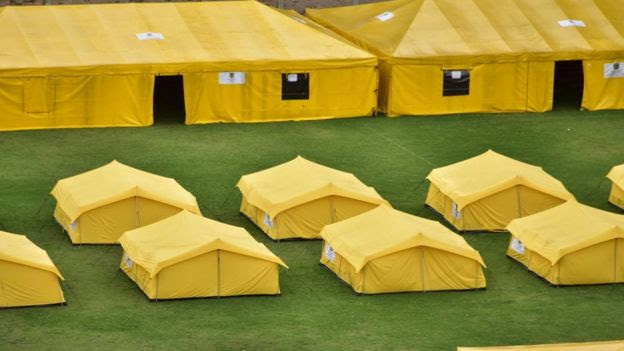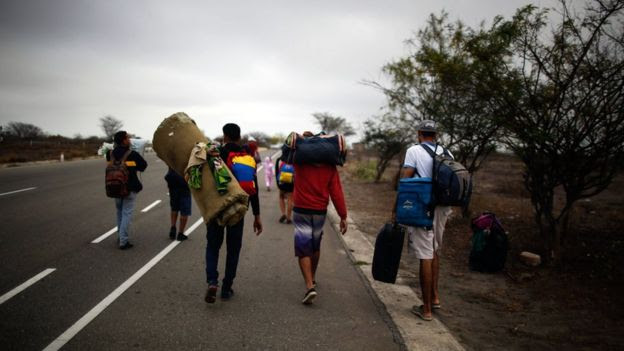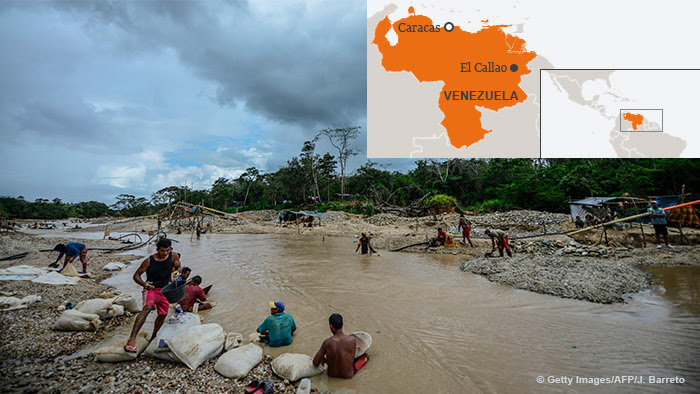The country that lost 3 million people
By Katy Watson. BBC South America correspondent

Venezuelan migrants walk out a bus terminal heading to an improvised camp in Bogota Image copyrightGETTY IMAGES
In Venezuela, the discussion about how long to stay, or where to flee and how to begin a new life, is never far from many people’s minds. Every time I visit the country, there are fewer friends and contacts to catch up with.
An estimated 5,000 people pack up their lives and leave every day, eager to flee the economic collapse and humanitarian crisis which has beset the oil-rich nation.
More than 3m people have fled Venezuela in recent years. According to the UN, that number is expected to rise to more than 5m by the end of 2019,
The vast majority of Venezuelans travel to other parts of South America. More than a million Venezuelans have chosen neighbouring Colombia as their new home, with half a million more travelling through it on their way further south to Ecuador, Peru and the countries beyond.
The lucky ones, those with connections, family members already established and an education, have found work in other parts. But I’ve also met plenty of former professionals selling water or food on the streets of Peru and Colombia to make ends meet.

[ This map omits Trinidad where thousands of refugees arrive in Cedros by boat. They are trading on roadsides. Ed. ]
“We are talking about people who are leaving not because of a natural disaster, not because of a war,” says Claudia Vargas Ribas, a migration expert at the Simón Bolívar University in Caracas.
New year, new challenges
The new year is widely expected to heap pressure on the Venezuelan government. On 10 January, Nicolás Maduro will be formally sworn in for another six years after being declared the winner in elections last May. These elections were largely boycotted by the opposition and were widely condemned by the US, the EU and most of Venezuela’s neighbours.
President Maduro blames “imperialists” – the likes of the US and Europe – for waging “economic war” against Venezuela and imposing sanctions on many members of his government.
But his critics say it is economic mismanagement – first by his predecessor Hugo Chávez and now President Maduro himself – that has brought Venezuela to its knees.
“We are going to have critical days and weeks beginning in January,” says David Smolanksy, an exiled opposition leader and now the head of the Working Group on Venezuelan migration for the Organisation of American States.

A view of the new camp which was set up for the Venezuelan migrants by Bogota’s Town Hall, in Bogota, Colombia on November 13, 2018____ Image copyrightGETTY IMAGES
The leadership of the opposition-controlled National Assembly changes in early January and some believe this could be the cause of further tension.
- Venezuela’s migration crisis: Is enough being done?
- How Venezuela’s crisis developed and drove out millions of people
“Maduro is going to want to project a show of strength,” says Geoff Ramsey, the assistant director of the Venezuela Programme at the Washington Office on Latin America (WOLA).
“I think that’s going to create a new level of dissatisfaction and the few that don’t have an escape plan will be activating them after Maduro officially takes his new term.”
The region reacts
Venezuela’s crisis will continue to affect all of South America.
“The countries in the region are developing countries, we can’t forget that,” says Claudia Vargas Ribas. “So receiving this quantity of people has made their internal affairs more complicated.”

Venezuela’s President Maduro speaks during a rally on University Student Day in Caracas_______Image copyrightREUTERS
Venezuela’s President Maduro is about to be sworn in for another six years in office
There have been efforts to co-ordinate the humanitarian response. There have been two meetings in Ecuador’s capital Quito and a recognition that countries need to work together to solve the crisis. A third is scheduled for the first half of 2019.
“If you compare what Latin America has done with what Europe has done [with its migrants] – Europe which has better conditions and is more economically developed – the example that Latin America is showing is enormous,” says sociologist Tomás Páez, who co-ordinates the Global Project of the Venezuelan Diaspora.
But with more and more Venezuelans arriving, could countries tighten their immigration rules?
“If they put brakes on it, what will grow is irregularity,” says Mr Páez, adding that drug-trafficking, prostitution and illegal industries will grow.
More to be done
Some experts believe what’s been promised so far is a drop in the bucket compared to what is needed.
“Regional governments are very interested in getting funding from the US and other donors” says Geoff Ramsey. “But they are much more apprehensive when it comes to providing mid- and long-term solutions to the crisis.”
Earlier this month, 95 organisations, co-ordinated by the UN Refugee Agency – the UNHCR – and the International Organization for Migration, launched the so-called Regional Response Plan for Refugees and Migrants from Venezuela.

Venezuelan migrants walk alongside a route, after leaving the CEBAF (bi-national border care center) facilities in Tumbes, Peru, near the border with Ecuador, on November 01, 2018.
Image Copyright GETTY IMAGES
More than three million people have joined the recent exodus from Venezuela.
The idea is to help respond to needs of those Venezuelans who are migrating as well as call on the international community to help fund aid efforts.
Geoff Ramsey says it is a great start but promises on paper are not enough.
“A meaningful solution to Venezuela’s displacement crisis will require Latin America to integrate these communities into their formal economies and job markets.”
The region doesn’t just need to respond to the crisis, it needs to keep up the pressure against Mr Maduro too, says David Smolanksy.
“You need the strong arm and the friendly hand,” he says.
“The region needs to be firm against the dictatorship – as long as it continues, people are going to flee.”
Venezuela and Guyana spar over Exxon Mobil oil seismic vessel
The offshore exploration work of an Exxon Mobil vessel has inflamed tensions between Venezuela and its eastern neighbor Guyana. The South American nations have been locked in a century-old territorial dispute.
A ship belonging to Exxon Mobil Corporation was “intercepted” by Venezuela’s navy, Guyana’s Foreign Ministry said. The incident caused a spat between the neighboring South American nations, which are involved in a century-long dispute over Guyana’s border territory.
Guyana’s government denounced the move by Caracas, calling it an “illegal, aggressive and hostile act.” The Foreign Ministry statement charged that the incident “once again demonstrates the real threat to Guyana’s economic development by its western neighbor; an act that violates the sovereignty and territorial integrity of our country.”
In a statement released on Sunday, Venezuela’s Foreign Ministry said its navy encountered two Exxon Mobil ships, in an area that it referred to as “undoubtedly Venezuelan sovereignty.” Caracas said that “given the flagrant violation” of its sovereignty, it had proceeded with the “appropriate protocols” for this kind of situation.
Read more: German reporter still detained in Venezuela under murky circumstances
A resource-rich area
The ship at the heart of the dispute is the Ramform Tethys vessel, which belongs to Norwegian company Petroleum Geo-Services (PGS). The vessel was conducting seismic survey work on behalf of Exxon Mobil, when it was approached by the Venezuelan navy.
Recent discoveries have given Guyana the potential to become one of Latin America’s largest oil producers. Venezuela, by contrast, has seen a massive decline in its crude output, which has tumbled to the lowest levels in nearly 70 years.
Embattled Venezuelan President Nicolas Maduro has previously said that Exxon Mobil’s offshore oil exploration is illegal, since it has taken place within the long-disputed Essequibo territory.
US backs Guyana
A spokeswoman for Exxon said the US oil firm’s seismic explorations in the western portion of Guyana’s Stabroek Block “have been paused until they can be safely continued,” and affirmed that the vessel was operating within Guyana’s exclusive economic zone.
The US was quick to weigh in on the incident. Deputy State Department spokesman Robert Palladino said in a message on Twitter that the US was monitoring the situation and criticized Caracas for the interference.
“We are monitoring reports that the Venezuelan Navy may have interfered with vessels operating on behalf of ExxonMobil. We underscore that Guyana has the sovereign right to explore and exploit resources in its territorial waters and Exclusive Economic Zone.”
“We call on #Venezuela to respect international law and the sovereignty of its neighbors,” Palladino added.
Read more: Multilateral approach needed to contain Venezuela’s refugee crisis, experts warn
The Essequibo dispute
The territorial dispute between Guyana and Venezuela dates back to the 19th century, when Venezuela claimed the mineral-rich region west of the Essequibo River, which comprises roughly 40 percent of present-day Guyana.
In 1899, an international tribunal ruled in favor of Guyana, which was a British colony at the time. Venezuela agreed to relinquish the territory, but later backtracked on its decision.
The Guyanese Foreign Ministry said it would report the seismic vessel incident to the UN, and that it would also inform the national governments of the 70 crew members aboard the vessel of the “threat to their safety.”
Venezuela’s Foreign Ministry said it had also informed the UN Secretary General of the “unacceptable violation” to its sovereignty. Caracas also “reiterated” its “call to re-establish a direct and respectful dialogue over this sensitive matter” with its neighbor.
jcg/aw (EFE, AP, Reuters)
Mafia war in Venezuelan gold mines

VENEZUELA’S ILLEGAL GOLD MINES____Karte Foto Kombo El Callao Venezuela ENG
There is a bloody mafia war raging for control of the unlicensed gold mines in the Venezuelan state of Bolivar. Miners get killed regularly, their bodies mutilated or riddled with bullets. They have flocked to this region as President Nicolas Maduro’s Socialist government has struggled with a three-year recession, spiraling inflation and food shortages.
Russia sends nuclear-capable bombers to Venezuela
Russian President Vladimir Putin and Venezuelan President Nicolas Maduro have been making a diplomatic show of their friendship, leaving Washington wary of Russia’s participation in a Venezuelan military exercise. (12.12.2018)
Venezuela’s anti-government newspaper, El Nacional, forced to stop the presses
El Nacional, the last major anti-government newspaper in Venezuela has ceased its print edition after 75 years amid pressure from the Maduro regime. The state controls imports of printing paper used by the outlet. (13.12.2018)
German reporter still detained in Venezuela under murky circumstances
Reporters Without Borders has still not been granted access to German reporter Billy Six — nor has his family. After five weeks’ detention on unclear charges, the press freedom group says no news “is bad news in itself.” (22.12.2018)
Venezuelan pianist Gabriela Montero: ‘How can we not take a stand?’
With an extremely rare gift for improvisation, the Venezuelan pianist has wowed audiences for decades. The de facto implosion of her homeland has made her an advocate for her people. (04.12.2018)
Multilateral approach needed to contain Venezuela’s refugee crisis
As Venezuela’s crisis spirals out of control, neighboring countries are looking out for themselves, shutting their borders to refugees. But experts warn the crisis cannot be resolved without a multilateral effort. (21.08.2018)
Venezuela’s illegal gold mines
Although working in the mines of eastern Venezuela is dangerous, diggers from all over the country head underground daily, pushed by the rise in gold prices and the severe economic crisis affecting the country. (24.03.2017)



